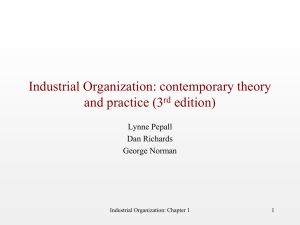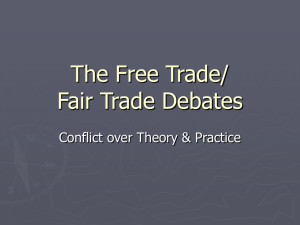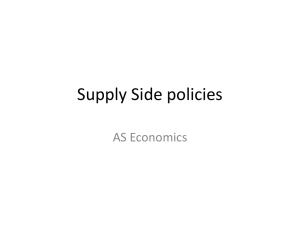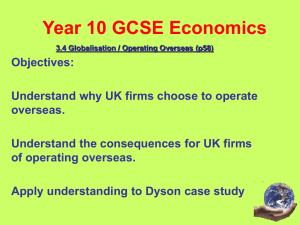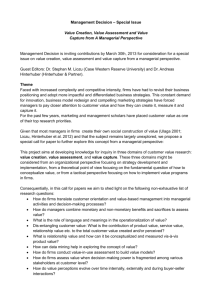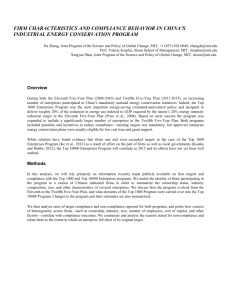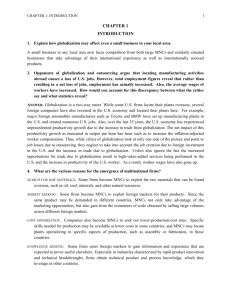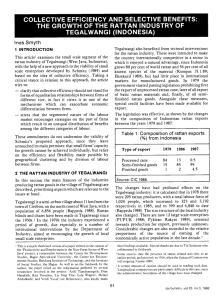The nature and scope of competition law policy
advertisement
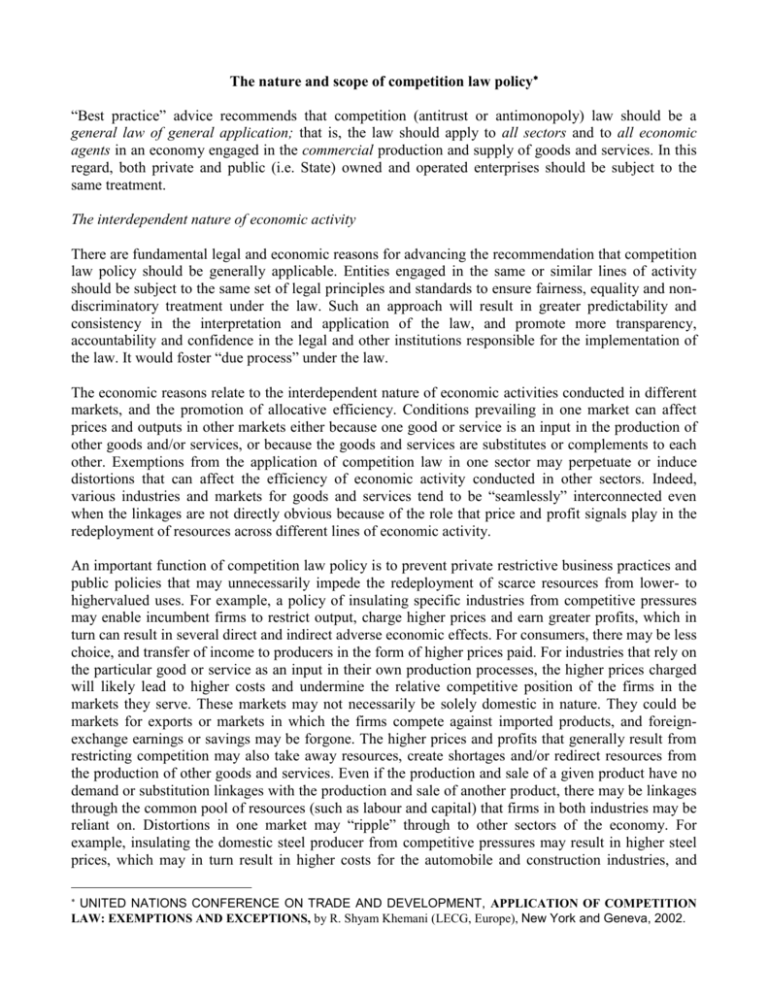
The nature and scope of competition law policy “Best practice” advice recommends that competition (antitrust or antimonopoly) law should be a general law of general application; that is, the law should apply to all sectors and to all economic agents in an economy engaged in the commercial production and supply of goods and services. In this regard, both private and public (i.e. State) owned and operated enterprises should be subject to the same treatment. The interdependent nature of economic activity There are fundamental legal and economic reasons for advancing the recommendation that competition law policy should be generally applicable. Entities engaged in the same or similar lines of activity should be subject to the same set of legal principles and standards to ensure fairness, equality and nondiscriminatory treatment under the law. Such an approach will result in greater predictability and consistency in the interpretation and application of the law, and promote more transparency, accountability and confidence in the legal and other institutions responsible for the implementation of the law. It would foster “due process” under the law. The economic reasons relate to the interdependent nature of economic activities conducted in different markets, and the promotion of allocative efficiency. Conditions prevailing in one market can affect prices and outputs in other markets either because one good or service is an input in the production of other goods and/or services, or because the goods and services are substitutes or complements to each other. Exemptions from the application of competition law in one sector may perpetuate or induce distortions that can affect the efficiency of economic activity conducted in other sectors. Indeed, various industries and markets for goods and services tend to be “seamlessly” interconnected even when the linkages are not directly obvious because of the role that price and profit signals play in the redeployment of resources across different lines of economic activity. An important function of competition law policy is to prevent private restrictive business practices and public policies that may unnecessarily impede the redeployment of scarce resources from lower- to highervalued uses. For example, a policy of insulating specific industries from competitive pressures may enable incumbent firms to restrict output, charge higher prices and earn greater profits, which in turn can result in several direct and indirect adverse economic effects. For consumers, there may be less choice, and transfer of income to producers in the form of higher prices paid. For industries that rely on the particular good or service as an input in their own production processes, the higher prices charged will likely lead to higher costs and undermine the relative competitive position of the firms in the markets they serve. These markets may not necessarily be solely domestic in nature. They could be markets for exports or markets in which the firms compete against imported products, and foreignexchange earnings or savings may be forgone. The higher prices and profits that generally result from restricting competition may also take away resources, create shortages and/or redirect resources from the production of other goods and services. Even if the production and sale of a given product have no demand or substitution linkages with the production and sale of another product, there may be linkages through the common pool of resources (such as labour and capital) that firms in both industries may be reliant on. Distortions in one market may “ripple” through to other sectors of the economy. For example, insulating the domestic steel producer from competitive pressures may result in higher steel prices, which may in turn result in higher costs for the automobile and construction industries, and UNITED NATIONS CONFERENCE ON TRADE AND DEVELOPMENT, APPLICATION OF COMPETITION LAW: EXEMPTIONS AND EXCEPTIONS, by R. Shyam Khemani(LECG, Europe), New York and Geneva, 2002. other industries that use steel as an input. Because of the artificially higher profits earned in the steel industry, the firms may be more willing to pay higher wage rates, and bid away labour from other industries, creating labour shortages or resulting in higher costs of production for other goods and services. Moreover, steel companies that have the comfort of assured domestic markets for their products will have fewer incentives to be innovative unless there are other offsetting measures imposed upon them. Thus, it should be recognized that the granting of exemptions and/or policies insulating any given sector (or firms) from competition are likely to have other direct and indirect adverse effects on the economic system as a whole. Whether the costs of such exemptions and exceptions or policies are outweighed by the benefits needs to be carefully assessed. Interface between competition law policy and other government economic policies Although the process of competition forces firms to become efficient, and offer a greater choice of products and services at lower prices, these may not be the sole reasons for Governments to enact competition legislation. Competition law policy in several countries is based on a multiple set of values that are neither easily quantifiable nor reduced to a single economic objective. These values may reflect a society’s wishes, culture, history, institutions and other factors that cannot be ignored nor should necessarily be ignored. A survey of the objectives of competition policy over time and across several countries indicates that the nature and scope of competition law policy tends to vary. In some countries, such as Canada and New Zealand, the primary objective of the competition legislation is to maintain and encourage competition, with emphasis being placed on the promotion of economic efficiency. In other jurisdictions, such as the United Kingdom, emphasis is placed on “public interest” – a broader concept than that of competition alone. In the United States the enforcement of competition laws has increasingly focused on consumer welfare and economic efficiency. However, this has not always been the case. When the Sherman Act was enacted in 1890 (and for much of the 20th century), there was an explicit preference for “pluralism” in terms of diffusion of economic power. There was also a tendency towards protection of small business and local economies. In the European Union, priority is given to economic or market integration and prevention of dominance by large firms. In Germany, as in several other member States of the European Union, preserving or ensuring freedom of individual action and economic freedom is viewed as being important among the objectives of competition law policy.5 In several developing countries, the spectrum of different objectives of competition law can be observed. For example, in Colombia, which is a small open economy, emphasis is placed on economic efficiency. In Indonesia and the Russian Federation, the law includes concerns regarding fairness, diffusion of economic power and safeguarding small and medium-sized enterprises. In several former centrally planned economies of Central and Eastern Europe, the competition laws have objectives and approaches which emulate those of the European Union – in part because of the aspirations of these countries to become members of the European Union. In addition to the differences in objectives and weights assigned to various economic and societal goals, competition laws also have an extensive interface with other government policies. The nature of this interface may be such that the aims of different government policies can be complementary, or in conflict with competition. In areas such as privatization, international trade, investment and regional development policies, there are often conflicts with the objectives of competition policy. In several countries, Governments have privatized State-owned enterprises with exclusive or monopoly rights so as to obtain a higher sale price and/or attract foreign investment. And import controls or investment restrictions are instituted in order to protect domestic firms, deterring new entrants and foreign investment. The differing goals of different government policies give rise to tensions regarding the priority assigned to competition law policy vis-à-vis the Government’s other economic policies and objectives. This leads to questions regarding (i) the extent to which competition law policy objectives should be accorded priority, and (ii) if exemptions and exceptions are deemed necessary, what is their underlying rationale, the parameters of the exemptions and exceptions, and whether the stated policy objectives can be attained by means that are less restrictive of competition.



